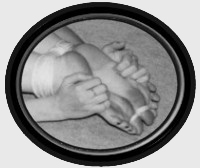Nonynony
Registered User
- Joined
- Jan 2, 2010
- Messages
- 39
- Points
- 0
So it's no secret Tickle stories and general thoughts on ticklishness, tend to boil down to the question "How sensitive are you?" or better yet, "how sensitive is your skin?" However, from what I can tell from what I've researched on tickling and experience, while some real stories imply skin might play a factor, basic psychology plays a bigger factor. Obviously, you can get tickled against your will but the reaction tends to be more spastic and noticeable with someone your comfortable or familiar with. I know my EX was less responsive on the days before our inevitable break up.
In addition, it's seems to stronger with either a sense of surprise or anticipation. As much as we like touching particular body parts :drool, many laugh when they're not even touched. And of course, much to our dissapointment :cry, some people can even turn their ticklishness off/ignore the sensation. Even if they're VERY ticklish I've seen people do this.
So yea, just wanta here yalls thoughts on this. Is it more psychological or physical? if more the former, can you psyche people out to be MORE ticklish?(often thought about that as I read about massage.) If physical stuff plays a part, then how?
In addition, it's seems to stronger with either a sense of surprise or anticipation. As much as we like touching particular body parts :drool, many laugh when they're not even touched. And of course, much to our dissapointment :cry, some people can even turn their ticklishness off/ignore the sensation. Even if they're VERY ticklish I've seen people do this.
So yea, just wanta here yalls thoughts on this. Is it more psychological or physical? if more the former, can you psyche people out to be MORE ticklish?(often thought about that as I read about massage.) If physical stuff plays a part, then how?












